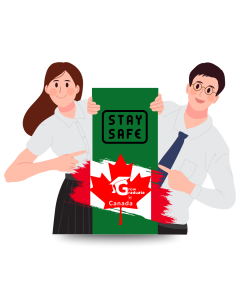Don’t Fall For It! Protecting Yourself from Scams in Canada
Settling into life in Canada is an exciting experience, but it also comes with challenges. One of the biggest risks international students face is scams and financial fraud. Scammers often target newcomers who may not yet be familiar with Canadian systems or who may hesitate to ask for help.
Being aware of these threats can save you stress and money and even protect your immigration status. In this guide, we’ll cover the most common scams targeting international students in Canada and practical steps you can take to stay safe.
Why Are International Students Targeted in Canada?
International students are often seen as vulnerable because:
- They are new to Canada’s laws, rules, and systems.
- They may not yet have strong local support networks.
- Scammers assume students are under pressure to secure housing, jobs, or immigration documents quickly.
Common Scams Targeting International Students
𝟭. 𝗧𝗵𝗲 𝗙𝗮𝗸𝗲 𝗚𝗼𝘃𝗲𝗿𝗻𝗺𝗲𝗻𝘁 𝗢𝗳𝗳𝗶𝗰𝗶𝗮𝗹 𝗦𝗰𝗮𝗺
Scammers may call, text, or email you pretending to be from the Canada Revenue Agency (CRA), Immigration, Refugees and Citizenship Canada (IRCC), or even the police. They claim you owe taxes or have a visa issue and demand immediate payment, often threatening arrest or deportation.
𝙍𝙚𝙙 𝙁𝙡𝙖𝙜𝙨:
- Aggressive or threatening language.
- Demands for payment through gift cards, cryptocurrency, or wire transfer.
- Requests for your Social Insurance Number (SIN) or bank details.
- Claims of immediate arrest or deportation.
👉 Remember: Canadian authorities will never threaten you by phone or demand instant payment.
 𝟮. 𝗧𝗵𝗲 𝗙𝗮𝗸𝗲 𝗛𝗼𝘂𝘀𝗶𝗻𝗴 𝗦𝗰𝗮𝗺
𝟮. 𝗧𝗵𝗲 𝗙𝗮𝗸𝗲 𝗛𝗼𝘂𝘀𝗶𝗻𝗴 𝗦𝗰𝗮𝗺
Finding a place to live can be stressful, and scammers take advantage by posting fake apartment listings at cheap prices. They’ll ask for a deposit or rent before showing you the property and then disappear.
𝙍𝙚𝙙 𝙁𝙡𝙖𝙜𝙨:
- Prices that are “too good to be true.”
- A “landlord” who refuses to meet in person.
- Pressure to send money quickly.
- Requests for payment before signing a formal lease.
👉 Always visit a property in person before paying any deposit.

𝟯. 𝗧𝗵𝗲 𝗙𝗮𝗸𝗲 𝗝𝗼𝗯 𝗢𝗳𝗳𝗲𝗿 𝗦𝗰𝗮𝗺
Students eager to find part-time work may encounter fake job ads offering high pay for little effort. These scammers ask for a “registration fee” or your bank details for “direct deposit” before you even start working.
𝙍𝙚𝙙 𝙁𝙡𝙖𝙜𝙨:
Unreasonably high pay for simple tasks.
Requests for upfront fees (legitimate employers never do this).
Poor grammar and spelling in job ads.
Pressure to share personal information too early.
👉 Always research the employer and never pay to get a job.

How to Protect Yourself
Being proactive is the best defense against scams targeting international students.
- Be Skeptical: If an offer or demand sounds too good or too scary to be true, it probably is.
- Verify Independently: If you get a call from a government agency, hang up. Find the official number on the government’s website (for instance Government of Canada website) and call them directly. Never use contact information provided by a suspicious caller.
- Don’t Rush: Scammers create a false sense of urgency. Take time to think and discuss the situation with a trusted friend or your school’s international student advisor.
- Guard Your Information: Never share your SIN, bank details, or passport number with unsolicited contacts.
- Trust Your Gut: If a situation feels wrong, it probably is. End the conversation or walk away.
- Report It: If you encounter a scam, report it to the Canadian Anti-Fraud Centre. This helps protect other students
Conclusion
Your journey in Canada should be safe and positive. By staying informed and cautious, you can effectively protect yourself from the financial scams targeting international students. Always remember to verify information, protect your personal data, and never hesitate to ask for help from your school or official authorities if something feels wrong. Stay vigilant, stay informed, and enjoy your time in Canada!





